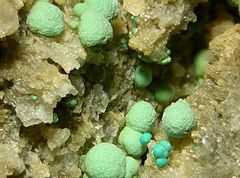Strashimirite
| Strashimirite | |
|---|---|
 | |
| General | |
| Category | Arsenate mineral |
| Formula (repeating unit) | Cu8(AsO4)4(OH)4·5(H2O) |
| Strunz classification |
08.DC.12 7/D.07-20 |
| Dana classification | 42.6.5.1 |
| Crystal symmetry |
Monoclinic Space group: P 2/m, P 2, or Pm |
| Unit cell | a = 9.71 Å, b = 18.81 Å, c = 8.94 Å; β = 97.2°; Z=3 |
| Identification | |
| Color | White, pale green |
| Crystal habit | Elongated, tabular crystals; crusts; radiating aggregates |
| Crystal system | Monoclinic |
| Cleavage | Parting at right angle to elongation |
| Mohs scale hardness | 2.5 - 3 |
| Luster | Greasy, pearly |
| Diaphaneity | Semitransparent |
| Specific gravity | 3.67 (calculated) |
| Optical properties | Biaxial (-) |
| Refractive index | nα = 1.726 nγ = 1.747 |
| Birefringence | δ = 0.021 |
| Pleochroism | Weak; Y = very pale yellowish green; Z = yellowish green |
| 2V angle | 70° |
| References | [1][2][3][4][5] |
Strashimirite is a rare monoclinic mineral containing arsenic, copper, hydrogen, and oxygen. It has the chemical formula Cu8(AsO4)4(OH)4·5(H2O).[6][7]
This mineral was discovered in Zapachitsa (Zapacica) copper deposit, Svoge, Sofia Oblast, Bulgaria in 1960, by the Bulgarian mineralogist Jordanka Minceva-Stefanova.[8] She named the mineral after Strashimir Dimitrov (1892-1960), Professor in Mineralogy and Petrography at Sofia University "St Kliment Ohridski", Bulgaria.[9] The International Mineralogical Association approved it as a new mineral in 1968.[10]
It occurs as a secondary mineral phase in the oxidation zone of copper arsenide deposits. It occurs associated with tyrolite, cornwallite, clinoclase, euchroite, olivenite, parnauite, goudeyite, arthurite, metazeunerite, chalcophyllite, cyanotrichite, scorodite, pharmacosiderite, brochantite, azurite, malachite and chrysocolla.[1]
Although it remains quite rare, strashimirite has subsequently been identified in a number of locations including: Novoveska Huta in the Czech Republic; on the west flank of Cherbadung (Pizzo Cervandone), Binntal, Valais, Switzerland; in Kamsdorf and Saalfeld, Thuringia, Germany; the Clara mine, near Oberwolfach, Black Forest, Germany; in the Richelsdorf Mountains, Hesse, Germany; Cap Garonne mine, near le Pradet, Var, and Triembach-au-Val, Haut-Rhin, France; Wheals Gorland and Unity, Gwennap, Cornwall, England; the Tynagh mine, near Loughrea, Co. Galway, Ireland; the Majuba Hill mine, Antelope district, Pershing Co. Nevada, USA; and the Centennial Eureka mine, Tintic district, Juab Co., Utah, USA.[1]
See also
List of minerals named after people
Notes
- ↑ 1.0 1.1 1.2 Handbook of Mineralogy information page for Strashimirite
- ↑ Mindat information page for Strashimirite
- ↑ Webmineral information page for Strashimirite
- ↑ Information about Strashimirite at RRUFF Database
- ↑ Strashimirite at Mineralienatlas Lexicon
- ↑ I. Mincheva-Stefanova (1968), "Strashimirite - a new hydrous copper arsenate", Zapiski RMO (Proceedings of the Russian Mineralogical Society), Part 97, 4. (in Russian)
- ↑ Frost, Ray L. and Keeffe, Eloise C. and Cejka, Jiri and Sejkora, Jiri (2009) Vibrational spectroscopic study of the arsenate mineral strashimirite Cu8(AsO4)4(OH)4.5H2O - relationship to other basic copper arsenates, Vibrational Spectroscopy, 50(2). pp. 289-297.
- ↑ Jordanka Minceva-Stefanova (Йорданка Минчева-Стефанова)(1923-2007)
- ↑ Michael Fleischer (1969), "New Mineral Names", American Mineralogist, vol. 54, at 1221
- ↑ D.Stoilova, J Minčeva-Stefanova (2001), "Infrared Spectroscopic Study of Strashimirite", Comptes rendus de l'Académie bulgare de science, tome 54, No. 8, 49-52.
| Wikimedia Commons has media related to Strashimirite. |